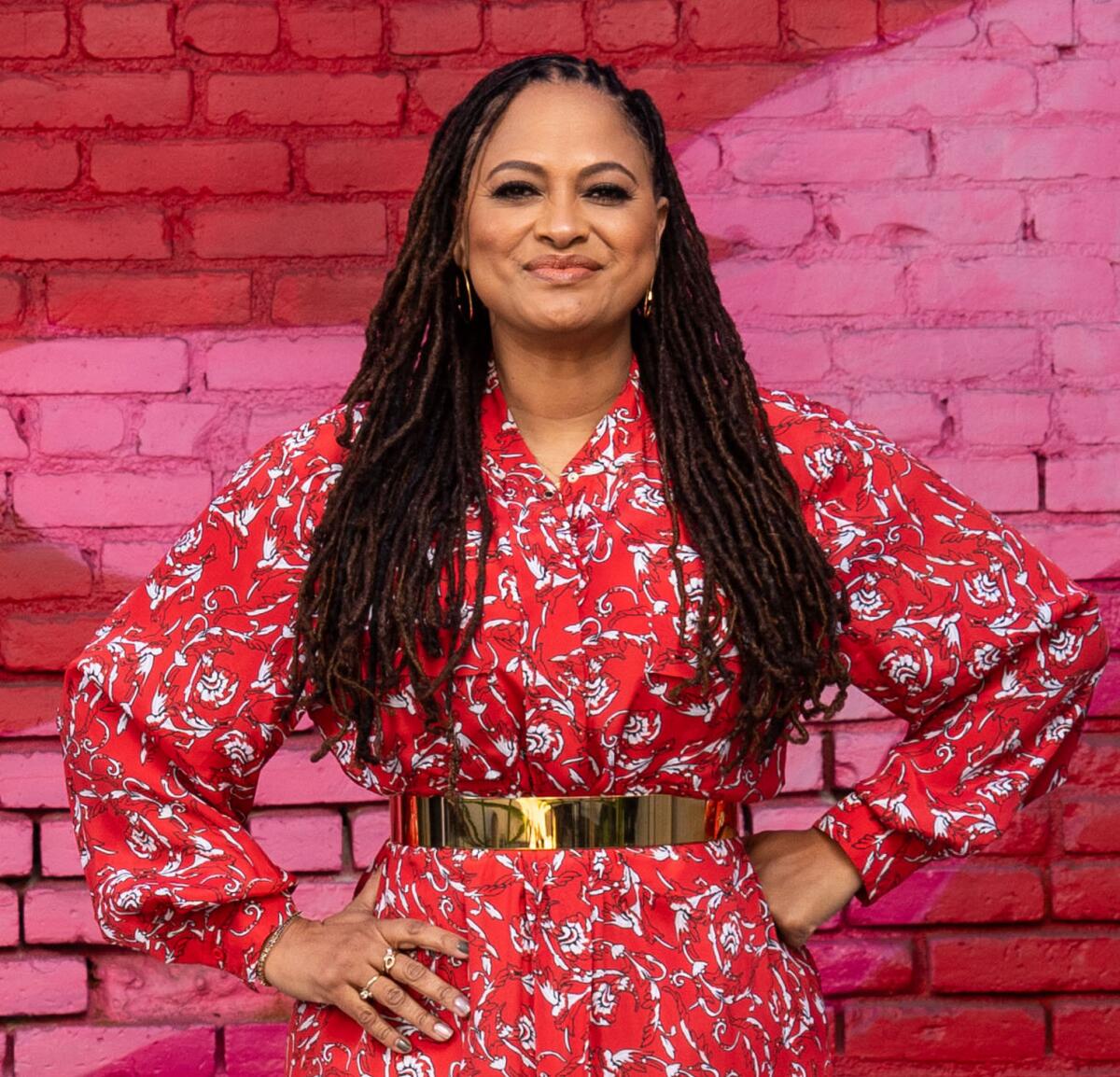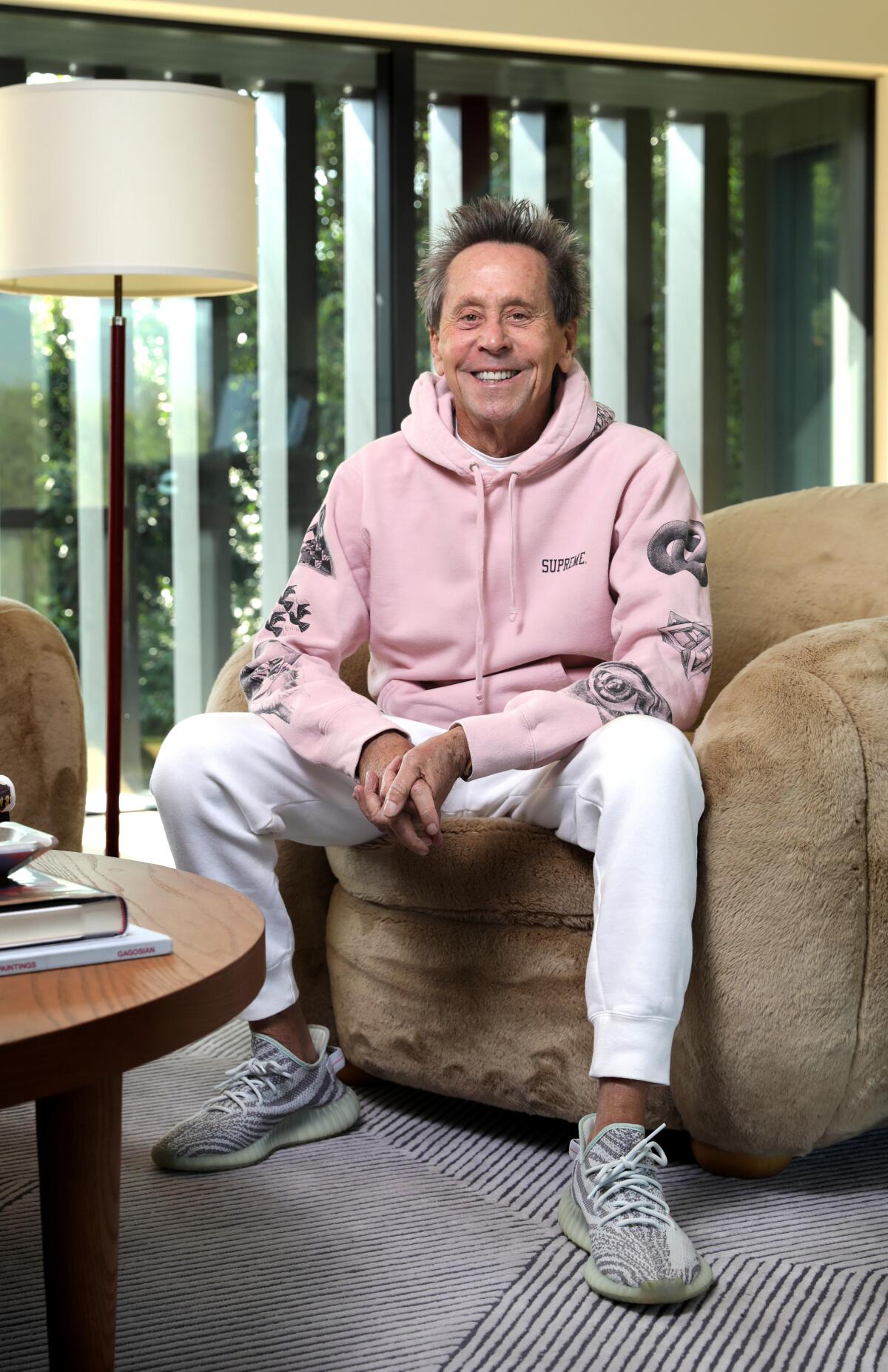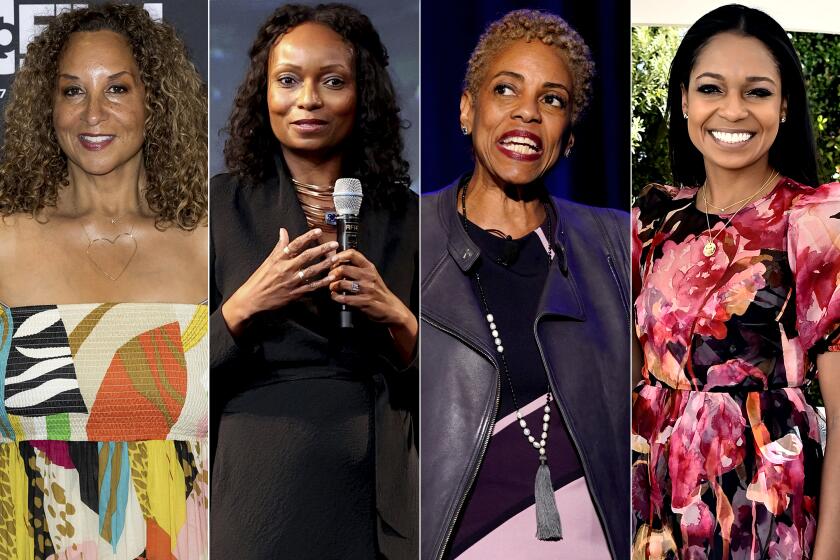Ava DuVernay teams up with Brian Grazer and Ron Howard to create massive hiring network

- Share via
In 2021, filmmaker Ava DuVernay launched the much-heralded Array Crew, a searchable database of below-the-line talent.
It was designed as a mechanism to diversify film and TV productions by connecting women, people of color and other underrepresented workers with producers, entertainment executives and those with hiring power. Every major studio and streaming service signed on as partners to finance the project.
Array Crew became a spoke in DuVernay’s expanding arts and social impact hub Array Alliance, the nonprofit arm of her company Array. It began with 500 names, quickly growing to more than 11,000 verified industry professionals. In all, more than 900 films, television shows, commercials and video projects have used the service, which is free to crew members.
Alongside conservative attacks on ‘woke’ entertainment, equity advocates call the departure of four key Hollywood diversity executives ‘frightening.’
Now, just two years after its launch, Array Crew is merging with Impact, the online professional network founded by Oscar-winning filmmakers Brian Grazer and Ron Howard, in what the trio is calling “the largest hiring network” in the entertainment industry.
“We really did recognize a shared mission here,” said Howard, who along with Grazer in 2020 launched their own app that enabled studio executives to connect with emerging writers.
DuVernay said it was a natural partnership, noting that Array Crew provides Impact’s network with “a whole bunch of people who traditionally feel like they’re outside of the system.”
At the same time, Array’s members will receive higher visibility and greater access to a much broader number of decision makers, the technology needed to grow and maintain an ambitious platform as well as the deep pockets to do so, DuVernay said.
Last November, Impact announced it had closed a $15-million round of funding (raising its total war chest to $21 million), led by Shasta Ventures with a roster of Silicon Valley and entertainment investors including Benchmark; Skydance; Snap Chairman Michael Lynton, the former chairman and CEO of Sony Entertainment; and “Billions” creators Brian Koppelman and David Levien.
The combined active user base of both Impact and Array Crew is 40,000 industry professionals who will now have access to a network of 1.2 million people working in the entertainment industry.
Under the terms of the deal, Impact has licensed and purchased assets from Array Crew and DuVernay’s venture will have an undisclosed ownership stake in Impact, according to Impact CEO Tyler Mitchell. He declined to disclose financial details of the deal.
For DuVernay, who made such films as “13th” “Selma” and the television series “Queen Sugar,” championing underrepresented workers had long been a hallmark on her own sets.
Over the years, she discussed having to create her own door into the industry. Executives were frequently asking her to recommend talent. As a result, she compiled a list — she saw a way to open that door for others. Array Crew began as a big list that became a Listserv, that ended up growing into a database.
When the three filmmakers started talking, they realized that they were aligned in wanting to expand entry into an industry that has largely been insular by design, they said.
“You begin to recognize this insulation is no good for the industry. It doesn’t make any business sense,” Howard said. “It’s bad for the art form and therefore it is also lousy for society and the audience.”

“The foundational ingredient is that we felt we can achieve this together ... but with the potential for a greater impact,” Grazer said.
DuVernay acknowledged that Array Crew faced hurdles.
“We were having challenges breaking into new markets and figuring out technology that would work worldwide,” she said. “Our challenges are that you have to become a tech company in order to run this as a robust digital platform.”
DuVernay said that despite the filmmakers’ different entry points, she quickly realized they shared a lot of common ground, and the conversation quickly evolved.
“What I really loved about Impact is they were saying, ‘We want to make a new system and we want everyone to feel like they’re included. So why don’t you come in with us?’”
While Array Crew will exist on Impact’s platform, its members’ profiles will be identified with badges and the site will have a filter enabling individuals to specifically search for Array Crew members. Existing members can opt out of participating in the merged database.
According to Mitchell, the database will remain free for crew. It is currently free for studio and other industry executives, but as the platform grows and becomes more successful, Mitchell said, it will begin charging studios to pay for the service.
Array Crew will no longer rely on funding from the studios but will be financed by Impact, Mitchell said. It is unclear how existing studio and streamer money will be used.
The move comes at a time of major paroxysms roiling Hollywood: The studios, under enormous financial pressures, have laid off thousands of workers, while the writers’ and actors’ strikes have shut down Hollywood.
At the same time, the studios appear to be retreating from their commitments to diversity and inclusion, as The Times recently reported. In recent months, diversity chiefs at Walt Disney Co., Netflix and the Academy of Motion Picture Arts and Sciences, all Black women, have resigned or were forced out of their jobs.
The trio say once Hollywood is back up and running, their partnership has a role to play.
“When the lights go back on, folks are really going to be searching for a road back to normalcy,” DuVernay said. “And so our goal was really to prepare this, to have everything ready,” but without backsliding on diversity and inclusion. “We’re just trying to make sure that we hold that line.”
More to Read
Inside the business of entertainment
The Wide Shot brings you news, analysis and insights on everything from streaming wars to production — and what it all means for the future.
You may occasionally receive promotional content from the Los Angeles Times.











